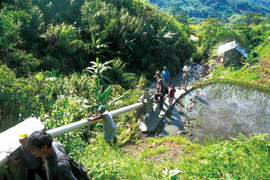The Mitsui & Co. Environment Fund
Introduction to Grant Projects
INDEX="502"
NAME="Sustainable village development model for promoting renewable energy and environmental conservation in the Cordillera Central region of Luzon, Philippines"
TYPE="活動助成,"
YEAR="2007年度,"
AREA="アジア,"
KIND="公益法人,"
ORG="Kiyosato Educational Experiment Project (KEEP)"
Kiyosato Educational Experiment Project (KEEP)
Sustainable village development model for promoting renewable energy and environmental conservation in the Cordillera Central region of Luzon, Philippines
Activity grant
- Project Description
This project is creating renewable energy models (micro hydro, biogas) that are well suited to the natural conditions and living environment of farming villages inhabited by the indigenous tribes of Kalinga Province on the Philippine island of Luzon, and implementing environmental conservation initiatives. It is advancing development that will improve living condition in these villages and help the inhabitants escape poverty, while still maintaining and preserving the natural environment. It will also hold seminars on organic farming and environmental conservation at schools.
- Fields
- Energy problem
- Grant year
- FY2007 Activity Grants
- Grant term
- 3 years
July 2007 - June 2010
- Grant amount
- 12,760,000 yen
- Activity region
- Pasil, Kalinga Province, Luzon Island, Philippines

Overview of the Organization

- Representative
- Akiyoshi Kato, Chairman
- Establishment
- 1956
- Establishment purpose
- Established at the foot of the Southern Yatsugatake Volcano Group in Yamanashi Prefecture by the American Dr. Paul Rusch in 1948 with the aim of spreading and promoting a democracy rooted in Christianity in Japan by restoring farming villages devastated by the Second World War and building new communities. It identified food supply, health, and hope for youth, as three immediate problems, and established and managed facilities to improve the situation regarding these, and contributed to social improvement and world peace by fostering a spirit of service.
- Main areas of activity
- All regions of Japan, US, Philippines
- Staff
- 90 full-time staff members, 10 part-time staff members
- Annual operating budget
- 1.24 billion yen in 2005, 1.31 billion yen in 2006, 1.40 billion yen in 2007
- WEB site
- http://www.keep.or.jp/
- Recent activities
- KEEP operates test farms in cold upland areas, clinics, churches, Seisen dormitory (training camp facility), nursery schools, and other facilities to acheive founder Dr. Rusch's goals of providing 'food supply, health, faith, and hope for youth'. In 1983 it became one of the earliest practitioners of environmental education in Japan. Nowadays Kiyosato is a famous tourist resort, but there are still many countries and peoples in the world who are struggling to get by. KEEP's mission is to build on its success in revitalizing the Kiyosato region to support aid efforts in the third world. Since 1988 it has been supporting international efforts to create regional development models for water supply, agriculture, health and sanitation, small-scale hydro power generation, and tree planting in Tulgao village, Kalinga Province, Philippines. Since 2002 it has been working with Filipino environmental NGOs on environmental education and regional development initiatives aimed at environmental conservation.